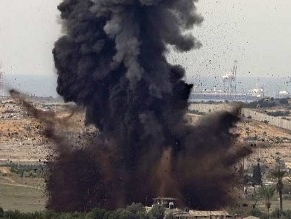|
World Jewish News

An explosion from an Israeli missile strike in the northern Gaza Strip on Dec. 27, 2008. Photo by: AP
|
IDF probes top officers on Gaza war strike that killed 21 family members
22.10.2010, Israel Senior army officers are under investigation for authorizing an air strike in Gaza during Operation Cast Lead that killed 21 members of the same family despite possibly receiving warnings from subordinates that there could be civilians in the area.
One of those involved in authorizing the strike was then-Givati Brigade commander Col. Ilan Malka.
A security source told Haaretz that the Military Police probe into the incident turned out to be particularly complex, and added that this is "explosive and highly sensitive material," which casts a shadow on senior figures in the military. If a decision is made to bring charges against those involved, the source said, there will be deliberations on the broader question of the rules of engagement during the operation. The rules of engagement had been described by officers who participated in Cast Lead as both excessive and overly lenient.
A decision on whether or not to charge officers has not yet been made.
The incident occurred on January 5, 2009, in the neighborhood of Zeitun in Gaza City. At the time, Givati units were on a mission in the neighborhood and identified the home of the Samouni family as a location of armed Palestinian militants.
An air strike was twice called in over a short period of time. Twenty-one people were killed, among them women and children, and 19 were injured.
Israel Defense Forces ground troops began operations in Zeitun on the night between the 3rd and the 4th of January. The forces also carried out some searches on the street where the Samouni clan lives. Some 100 family members had gathered in one of the homes.
According to the testimony of the family members, the IDF forces entered the home on January 4 and ordered them to stay in the home that they had already searched.
Some family members went out occasionally to collect wood for a fire. The soldiers watching the house knew clearly that there were civilians there.
On January 5 at 7 A.M., three or four missiles struck the home and its environs. According to witnesses, the missiles were fired from the air.
In two other cases in the same area, there were reports that three other members of the clan had been killed by the IDF.
Following the operation, IDF Chief of Staff Gabi Ashkenazi appointed a number of investigation teams to look into unusual incidents. A team headed by Col. Tamir Yadi did not conclude that there had been anything out of the ordinary in the air strike.
Pressure from the UN following the Goldstone report led to the appointment of another team of investigators, headed by Col. Erez Katz, in November 2009.
The investigators' conclusions led Military Advocate General Maj. Gen. Avichai Mendelblit to order a Military Police investigation into the possibility that there had been a violation of the rules of engagement.
At the time the MAG explained that the delay in ordering an investigation stemmed also from the different incidents involving members of the Samouni clan.
Security sources told Haaretz that the investigation included testimonies from air force officers who had warned the Givati Brigade commander that there could be civilians in the area.
During the investigation, the Brigade commander said that he had not been aware of the warning that there may be civilians and that the choice of missiles over gravity bombs - which would have caused more damage - was proportional to the risk the troops were running when confronted by militants nearby.
The chief defense lawyer in the IDF, Col. Udi Ben-Eliezer, who is representing Malka, told Haaretz that "the brigade commander's actions were aimed at removing the immediate threat to his soldiers, in line with the data he had at the time."
At least two very senior officers, outgoing GOC Southern Command Yoav Galant, and GOC Central Command Avi Mizrahi, opposed an MP investigation. Mizrahi said that on the basis of his professional evaluation of the video of the attack Malka had behaved "reasonably. In his place I would have done the same."
By Amos Harel and Anshel Pfeffer
Haaret.com
|
|
